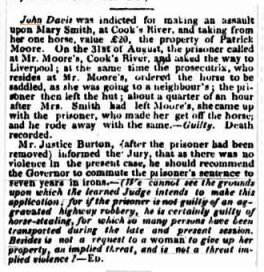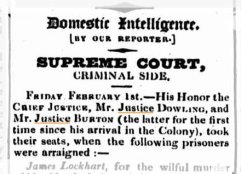In my last post about Nicholas Delaney’s murder on September 3, 1834, I asked a few questions. Why would the editor of the Sydney Monitor add a note to the end of the report of John Kennedy’s trial in which he questioned the verdict? And what about Dr Black and Justice Burton, whose opinions may have swayed the jury?
Today I’d like to have a look at some of the background to this story.
The Monitor‘s editor, Edward Smith Hall (1786-1860), was a remarkable man. A committed Christian and a contrarian, he was never afraid to speak his mind when he disagreed with what was going on in New South Wales. I won’t give you his life story as that would take too long, but here’s one biography.
Hall arrived in Sydney on October 10, 1811, with letters of recommendation from William Wilberforce, among others. Farming his grant of land didn’t turn out to be successful, and he threw his energies into social and religious work. In 1813 he co-founded the New South Wales Society for Promoting Christian Knowledge and Benevolence, which became the Benevolent Society in 1818. He was appointed cashier and secretary of the Bank of New South Wales in Macquarie Place (one of Nicholas Delaney’s projects) in 1817 and became a coroner in 1820 – experience which would qualify him to comment on John Kennedy’s trial.
In 1826 he and Arthur Hill published a new paper, the Monitor, with the motto ‘nothing extenuate nor set down aught in malice’. Hill resigned the next year, and Edward Smith Hall carried on as editor, opposing what he saw as injustices and helping to bring down Governor Ralph Darling. He held the position until 1840, an unprecedented length of time in those days.
Hall didn’t always add his views to the end of a report (after all, as editor, he had the whole paper to epress his opinions) but it’s interesting to see that the report on Justice Burton next trial after Kennedy’s that day has a longer comment.
I like his politely sarcastic tone: “We cannot see the grounds upon which the learned Judge intends to make this application…” and his questioning of what he sees as doubtful judgements.
And yes, I am biased!
So what about William Westbrooke Burton? Again, I won’t go into his life story , including his judgements about the rights of Aboriginal people, here, but the relevant facts are that he was appointed to the bench of the Supreme Court of New South Wales in 1832 and soon expressed his opinion that “an overwhelming defect of religious principle” was the cause of the many crimes in the colony, may of which led to the death penalty.
He had a low opinion of convicts, emancipists and Catholics. You might think that this could have biased him against Nicholas, but John Kennedy may well have been Catholic himself, and although I haven’t found any evidence of his being a convict, I’ve seen none that shows he came free, either.
Judge Burton served two terms in New South Wales, resigning in 1861 after a conflict over land legislation. He is credited with contributing towards the ending of convict transportation to New South Wales through his influence on the report of the select committee on transportation (the Molesworth Committee) in 1837.
Since my last post I’ve found the record of the inquest into Nicholas’s death. John Dight had been the coroner at Evan since 1828. The Registers of Coroners’ Inquests, 1796-1942 (thank you, Ancestry!) shows that he carried out the inquest himself on September 27 and found a verdict of “manslaughter ag[ains]t Jno Kennedy”.
The Monitor report says that Dr Black’s opinion was different. “It was his… opinion, that [Nicholas’s head wounds] were caused by falls” and not by being hit with a stick or rock. I haven’t found out much about the doctor except that he practised in the Penrith area and was called as a witness in court several times.
Not surprisingly, John Kennedy is hard to track down. I don’t know where he came from before he turned up as a labourer in Penrith. There are various convicts with the same name, but it’s not an unusual one. Peter Mayberry’s Irish Convicts to New South Wales shows 20 arriving before 1834, six of whom were labourers.
As for what happened to him after the trial, the Supreme Court document notes that on November 15, 1834, he was “found Guilty of Larceny from the person and Not Guilty of putting in fear”. Three days later it adds: “Transported for Life”. The Sydney Herald was one of four papers to report the verdict.
It states that he was sent to a penal colony – perhaps Norfolk Island or Van Diemen’s Land (now Tasmania). Better than being hung, you might think. But while I was trawling Trove for any clues about Kennedy after 1834 (and found nothing I could pin down), I did see a story about a man given the same sentence, who commented that he would rather hang than be transported.
There’s one last mystery to look at. Attorney General John Kinchela‘s document lists these men as witnesses: Abram Samuel, John McPetre, Thomas Carty, John Delany [sic] and Michael Mulcahy. The second last on the list has the same name as Nicholas and Elizabeth‘s eldest son. Since John had his parents living with him, it’s safe to guess that the John Delany on the witness list is the same man.
Michael Mulcahy is interesting, too. That’s the name of the man Elizabeth married in 1835, the following year. Was he a family friend? I’ve still got to track him down.
Since my last post, Aussie genealogy blogger cassmob has asked: “Was the judge simply stating the legal situation? … Did the jury think it wasn’t beyond reasonable doubt and hence their conclusion?” Fair comment. I’ll probably never know, since the Monitor is the only place Kennedy’s trial seems to have been recorded. Sometimes we just have to let go. But maybe you know something more about the background to this story?
Further reading and sources:
Review of Edward Smith Hall and the Sydney Monitor by Erin Ihde in The Resident Judge of Port Phillip
Edward Smith Hall in the Australian Dictionary of Biography, Wikipedia and monitorhall.org
Judge (later Sir) William Westbrooke Burton in the ADB and on the Parliament of New South Wales website
… and, of course, Trove












Pingback: So was Nicholas Delaney murdered? Did John Kennedy hang? (Trove Tuesday post, part 2) | A Rebel Hand: Nicholas Delaney of 1798
Having sat through an 11month re-trial in 2000, here in the Supreme Court of South Australia, this case is pretty typical of our Adversarial System of Justice. You have the possibility of a biased and/ or corrupt judge, a coroner’s judgement differing to that of others, possible “hired gun” witnesses, the media making inappropriate comment re: the case and maybe a guilty man has not been punished?… Maybe?… and that’s frustrating for the family of Nicholas Delaney, indeed it is, but far better than the opposite and that’s an innocent man wrongfully convicted and murdered by the state. If I sound passionate Frances it’s cos I am… having a relative wrongfully convincted of attempted murder, unable to prove his innocence for many of the reasons described above, and sentenced to spend 22years of his life incarcerated… but at least he’s still alive, despite 3 attempts on his life whilst in prison.
Absolutely brilliant and thorough research Frances and can only guess at what a shock it was to read of your Richard’s sad and lonely death. May he R.I.P.
LikeLike
Pingback: My first Australian ancestor (Australia Day Challenge 2013) | A Rebel Hand: Nicholas Delaney of 1798
Happy Blogiversary. I’m working on a book at the present time on a subsidiary family line that nobody knew anything about. I really love the research, but the writing is a real challenge. In my blog I’m transcribing the letters about an ancestor I know a lot about. Also am trying to link him to genealogy information, and help others do the same. Does your book tell about HOW you found out about your ancestor. I’m trying to do the How and What in my book. Somedays I just don’t know, but it is really a work of love so I hope I finish it.
Congratulations on our book as well!!
Regards,
Grant Davis
thestephensherwoodletters.blogspot.com
LikeLike
I see according to Geneabloggers, today is your 2nd year anniversary since you’ve been blogging. Happy Blogiversary.
Regards, Jim
Hidden Genealogy Nuggets
LikeLike
Hi Jim, thanks! For some reason WordPress put your kind comments in the Spam folder. So sorry I haven’t replied earlier.
LikeLike
Great Story. I was browsing on Geneabloggers and saw your site.
Regards, Jim
Hidden Genealogy Nuggets
LikeLike
Thank you, Jim! Geneabloggers is great, isn’t it.
LikeLike
Pauleen has said very much along the lines of what I came to express… it is definitely intriguing and great research. It also shows us that it is important to keep digging, even if you think that the answers may not be found. I have found so much on my husband’s family as time passes… more and more is released, especially in Trove.. Just when I think I can close the ‘book’ on them as it were, another clue, another tangent and all else is left behind again…
LikeLike
Another great post! What I especially like about this series is that you’ve shown how important it is to follow all the threads of clues. I thought it intriguing about the editor..plainly not a man afraid to express his opinion! Very interesting that the inquest found manslaughter and that was contradicted by the “expert witness”. I was quite pleased to see Kennedy’s sentence as it was fitting for manslaughter, which I think it was….to me the evidence strongly suggests he took advantage of the fact Delaney was a ” bit the worse for wear”. Great research!!
LikeLike
It’s really tough when we are left with what was ‘reported’ Congrats on all the new stuff you managed to unearth!
LikeLike
Thanks, Martine! It can be really frustrating. Maybe I’ll find out more one day. But then if everything was neat and tidy, finding out about the past would be a lot less interesting… that’s what I tell myself when I hit brick walls, anyway.
LikeLike